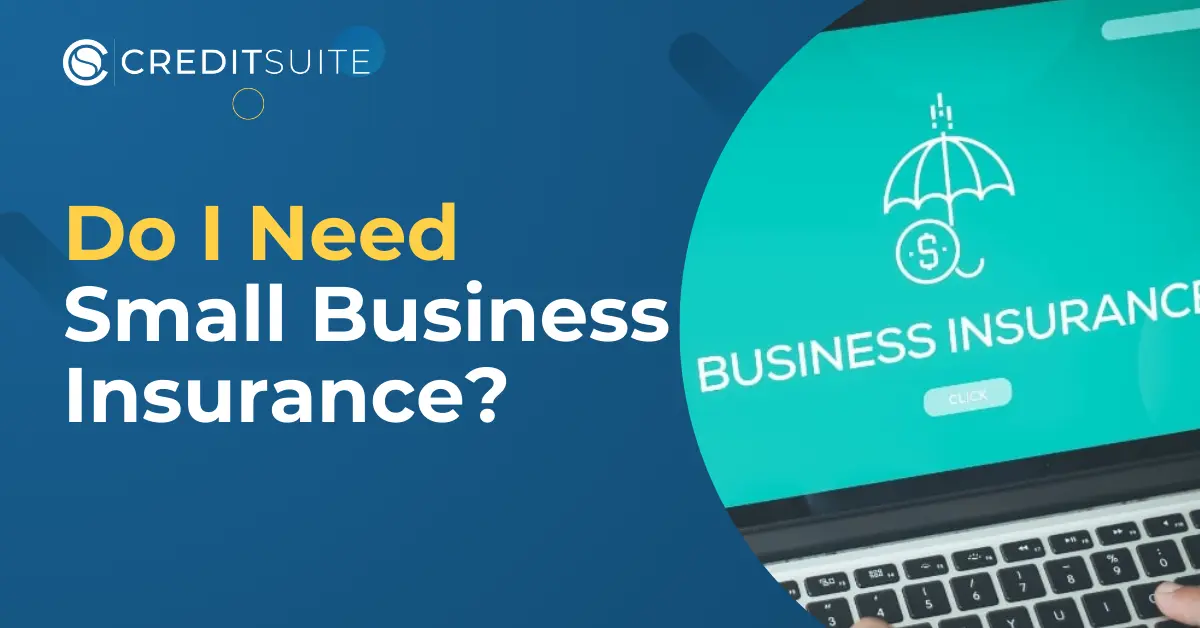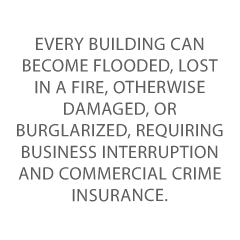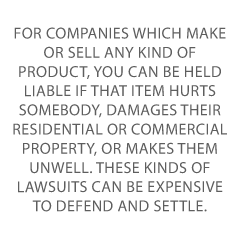It’s probably a question you’ve asked at least once: Do I need small business insurance?
And the answer is nearly always going to be “yes”.
If you’re working from home, your homeowners insurance might not cover equipment breakdown, or what happens if you’re out of commission for an extended period. It likely won’t cover if customers come to your home and someone is injured.
Business vehicles need small business insurance, even in states where it’s not mandatory.
What Types of Business Insurance do I Need for a Small Business?
There are several different types of small business insurance, all based on a few basic principles.
All equipment can fail, injure someone, or be stolen, requiring general liability insurance, commercial property insurance, and equipment breakdown coverage.
Any employee or client can be injured or even killed during the course of business, requiring insurance for employee benefits and workers’ compensation insurance.
Every building can become flooded, lost in a fire, otherwise damaged, or burglarized, requiring business interruption and commercial crime insurance.
Any product or raw material can potentially injure or kill a worker or customer, requiring coverage for product liability.
Every stage of getting a product or service to market can go wrong, resulting in injury, damage, or death, requiring product liability and potentially also cyber liability insurance.
Every worker can suffer a lapse in judgment, resulting in injury, death, or damage, to themselves, customers, other employees, or visitors to the site, requiring commercial auto insurance and potentially also professional liability coverage,
At least one person is key to continued and sustained business operations, requiring key person insurance.
Any incident may exhaust policy limits, requiring commercial umbrella insurance.
Insurance is about anticipating problems, and proactively moving to avoid letting them destroy a business.
9 Types of Business Insurance
Insurance companies offer several types of small business insurance. Some will not apply to your industry. And some will only apply if you have staff, a building, or vehicles.
The best-known and most likely to be necessary are:
- General liability insurance
- Business interruption insurance
- Workers’ compensation
- Insurance for employee benefits
- Commercial property insurance
- Commercial auto insurance
- Cyber liability insurance
- Product liability insurance
- Key person insurance
Let’s look at each type of small business insurance, in turn.
1. General Liability Insurance
Every business is going to need general liability insurance. It serves as business liability insurance for:
- Third-party physical injury
- Third-party property damage
- Advertising and marketing injury (accusations of libel, aspersion, copyright violation, etc).
Your type of small business, its size, assets, as well as your business structure will establish the amount of premium insurance you need. But this insurance policy will not cover motor vehicles.
In addition, the state of your small business credit can affect how much you pay an insurance company for general liability insurance. Hence, in addition to helping you get small business financing, how you pay off any given business credit card can help to lower your general liability insurance premiums.
2. Business Interruption Insurance
If your business property sustains property damage, you might not have the ability to keep your business open during repairs. This kind of insurance can help cover financial loss.
It can cover your staff’s payroll, taxes, overhead, debt repayment, and sometimes the expense of a short-term location. Many a small business owner used business interruption throughout the height of the Covid-19 pandemic when they had to shut their doors.
Such insurance is also useful if your business is in an area hit by a natural disaster. Use commercial property insurance to repair any damage. But this type of insurance helps tide you over while your business recovers.
3. Workers Compensation Insurance
If you employ staff, you are legally required in many states to get workers’ compensation insurance.
Workers’ comp protects you and your workers if they are injured or become ill at work. It can cover a worker’s medical costs as well as lost wages while they are recuperating.
If an employee agrees to accept workers compensation as part of their hiring package, they typically waive the right to sue you for an accident at the workplace.
However, if there are any questions as to coverage, the matter may end up being decided in a court. And, a small business owner with employees may also want to consider employment practices liability insurance.
4. Insurance for Employee Benefits
You will have to provide unemployment insurance no matter what. Insurance commissioners will have differing rules, so check your state.
A small business owner may want to provide employees with various benefits. Particularly during the Great Resignation, offering benefits could be the difference maker when it comes to being able to hire a new employee.
Typically, depending on the size of your company, you should provide disability insurance, health insurance, as well as other coverage, like life insurance. This is to help protect your workers.
And if you have great business credit, you might be able to save money on all these types of insurance.
5. Commercial Property Insurance
If you have a physical address, you must carry commercial property insurance to cover losses of company or personal property. It normally covers damage to the structure and inventory or property within it from damage from storms, fire, burglary, or vandalism.
It may also make sense to consider a business owners policy (BOP) depending upon the size and assets of your corporation.
Insurers often offer a business owners policy to small and medium-sized businesses. A business owners policy will normally combine general liability insurance and business interruption coverage.
You can frequently add riders to such policies. It can be more cost effective to bundle it with coverage you currently need. That may include flood insurance no matter where your business is located. The best person to ask about this is your commercial insurance agent.
6. Commercial Auto Insurance
If you use a vehicle for company purposes, then you are going to need commercial auto insurance. Because if you get in a crash while doing business-related work, your personal auto insurance may not cover it. Some insurance firms will call for separate policies for dump trucks and semis.
As of the middle of 2022, only New Hampshire and Virginia do not require auto insurance coverage. However, many states will accept a bond in lieu of purchasing an insurance policy. You will need to deposit the amount of the bond (although you can pay it over time).
7. Cyber Liability Insurance
If your corporation is ever the subject of a data breach and information was accessed or taken, cyber liability insurance can:
- Notify anyone impacted by the breach
- Give them credit monitoring
- Cover the costs of informing the general public (if necessary)
Some insurance providers refer to this as data breach insurance. Anyone that stores customer data digitally should get this, as your general liability policy will not cover this type of incident.
Businesses which are wholly online should seriously consider this form of coverage.
8. Product Liability Insurance
For companies which make or sell any kind of product, you can be held liable if that item hurts somebody, damages their residential or commercial property, or makes them unwell. These kinds of lawsuits can be expensive to defend and settle.
This insurance can help cover associated medical expenses, the replacement of the purchased product, and even legal costs and settlement expenses if your corporation is taken to court.
Distributors and sellers can be the subject of product liability lawsuits, so they, too, should consider this type of insurance. This can include both wholesale and retail sellers.
9. Key Person Insurance
A small business may do well to think about key person insurance, and cover them with key person insurance.
That way, if there’s a single person—this could be you—key to the operation of your company, the business won’t grind to a screeching halt if that key person were out for a long time (like, with Covid).
This type of coverage can help to cover any kind of associated monetary losses for a particular time till your business replaces this person, or they go back to work.
This is different from business interruption, which kicks in if a business is closed due to sustaining property damage.
Professional Liability Insurance
If you run a corporation where you offer expert guidance or are in charge of finishing jobs—such as a physician, lawyer, or architect—you need to carry professional liability insurance. It’s also called errors and omissions insurance.
This sort of small business insurance policy can safeguard you and your business if you’re ever accused of negligence (or were negligent), missed deadlines, undelivered services, or breach of nondisclosure or breach of copyright.
Doctors as well as other professionals usually should carry a specialized kind of professional liability—malpractice insurance. But even plumbers, real estate professionals, and event planners can use professional liability insurance.
Commercial Umbrella Insurance, Commercial Crime Insurance, and Equipment Breakdown Coverage
An umbrella policy may cover business risks that a pre-existing policy omits. If the policy limits of your general liability policy are met, umbrella insurance coverage can step in to cover whatever remains. Yet umbrella policies can’t and won’t cover everything.
Two other kinds of small business insurance to think about are commercial crime insurance, and equipment breakdown coverage. Crime insurance can protect your corporation if you’re robbed (even by a staff member). It can help cover monetary losses other kinds of insurance might not.
Equipment breakdown covers damage to or the loss of your A/C systems, boilers, furnaces, and computers and other electronic devices, if harmed by power surges or they break down.
Conclusion
Small business insurance is the epitome of preparing for the worst while simultaneously hoping for the best. It helps you keep your business. Any small business insurance cost is well worth paying.



